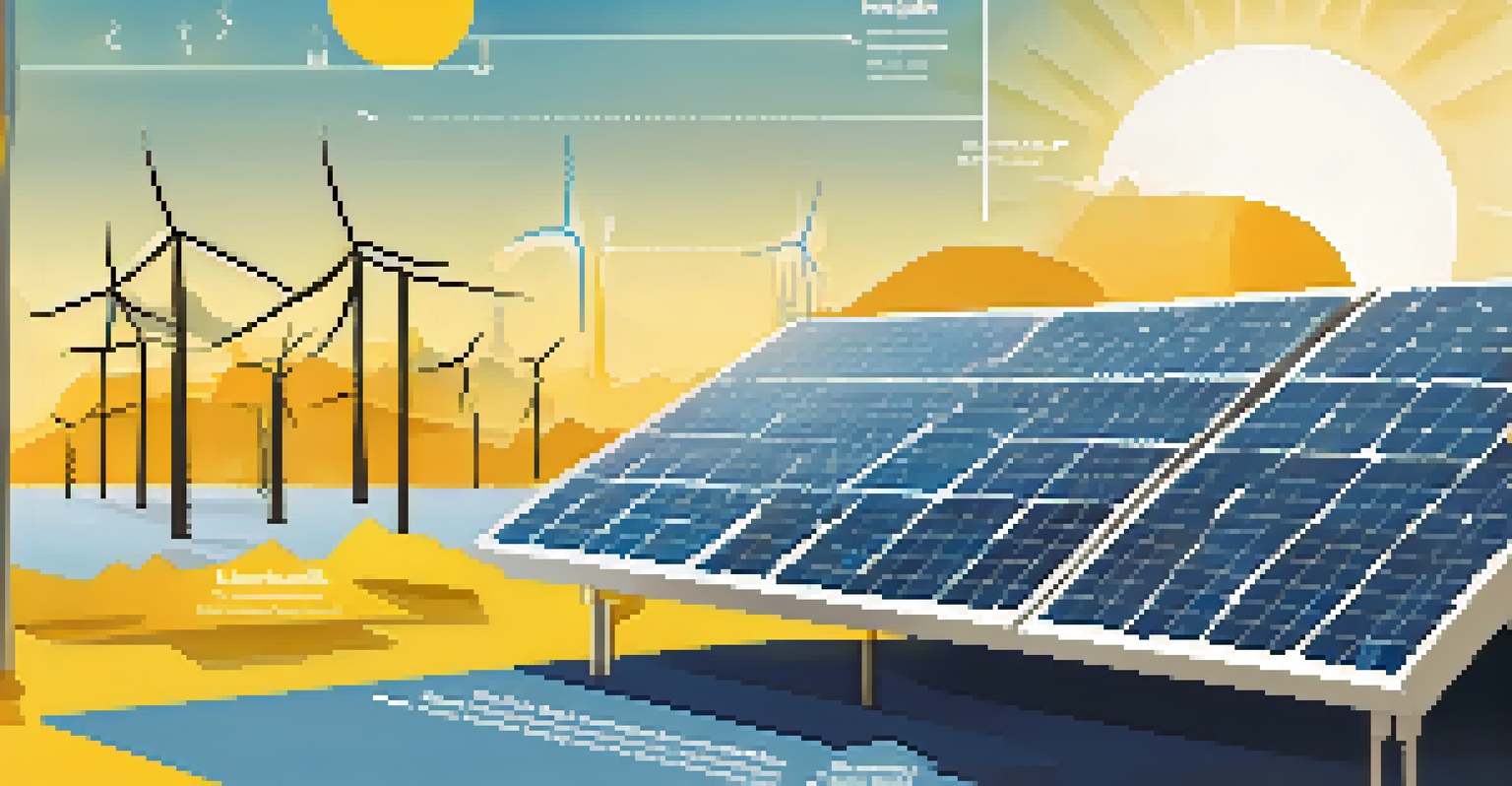Solar Panels: A Smart Investment for Your Home's Future

Understanding Solar Panels: What Are They?
Solar panels are devices that convert sunlight into electricity, making them a popular choice for homeowners looking to harness renewable energy. Essentially, they work by using photovoltaic cells to capture sunlight and turn it into usable power for your home. This technology has advanced significantly, making solar panels more efficient and accessible than ever before.
The sun is the most powerful energy source available to us, and harnessing it is the key to our sustainable future.
When you install solar panels, you’re not just investing in energy; you’re investing in a sustainable future. Imagine your home generating its own electricity, reducing your dependence on the grid. This self-sufficiency is a growing trend among homeowners who want to take control of their energy consumption.
Furthermore, the environmental benefits are substantial. By reducing your reliance on fossil fuels, you're contributing to a cleaner planet, which is increasingly important in our climate-conscious world. As more people become aware of these benefits, the popularity of solar energy continues to soar.
The Financial Benefits of Solar Energy
Investing in solar panels can significantly reduce your electricity bills, leading to substantial long-term savings. With utility costs on the rise, generating your own energy means lower monthly expenses and less vulnerability to fluctuating energy prices. Many homeowners report saving hundreds, if not thousands, each year after going solar.

Moreover, government incentives and tax credits make solar energy even more attractive financially. Programs like the Federal Investment Tax Credit (ITC) allow you to deduct a significant portion of your solar installation costs from your federal taxes. This can dramatically reduce the upfront investment required, making solar energy accessible to more households.
Solar Panels Reduce Energy Costs
Investing in solar panels can significantly lower your electricity bills and provide long-term savings.
Additionally, solar panels can increase your home's value. Homes equipped with solar energy systems often sell at a premium compared to those without. Buyers are increasingly looking for energy-efficient homes, so having solar panels can make your property more appealing in a competitive real estate market.
The Environmental Impact of Solar Energy
Switching to solar energy is not just a smart financial decision; it's also a powerful way to contribute to environmental sustainability. Solar panels produce clean energy with minimal greenhouse gas emissions, helping to combat climate change. By choosing solar, you're making a positive impact on the planet for future generations.
Solar energy is the most abundant energy source on the planet, and it can power our future sustainably.
Moreover, solar energy reduces the demand for fossil fuels, which are a major source of pollution and environmental degradation. Every kilowatt-hour of solar electricity generated means one less kilowatt-hour produced from a polluting source. This shift not only benefits the environment but also supports the transition to a more sustainable energy system.
By investing in solar panels, you're joining a growing movement of eco-conscious individuals committed to protecting the Earth. Each panel installed is a step towards reducing our carbon footprint and promoting a healthier planet. It's not just about saving money; it's about making a difference.
How Solar Panels Work: The Basics
At the core of solar panels is the photovoltaic (PV) technology, which converts sunlight directly into electricity. When sunlight hits the solar cells, it knocks electrons loose from their atoms, creating a flow of electricity. This process is known as the photovoltaic effect and is the foundation of solar energy generation.
Once the energy is generated, it can be used immediately to power your home or stored in batteries for later use. If your system produces more electricity than you need, you may be able to sell this excess back to the grid through net metering, further enhancing your savings.
Environmental Benefits of Solar
Switching to solar energy helps reduce greenhouse gas emissions and supports a cleaner, sustainable planet.
Understanding how this technology works can help demystify the process and encourage more homeowners to consider solar energy. It’s not just about panels on the roof; it’s a sophisticated system designed to make the most of natural sunlight.
Choosing the Right Solar Panel System for Your Home
Selecting the right solar panel system can seem daunting, but it doesn't have to be. Start by assessing your energy needs and understanding how much electricity you consume on average. This information will help determine the size and capacity of the solar system that’s right for you.
It's also important to consider factors such as roof orientation, shading, and local climate conditions, as these can impact the efficiency of your solar panels. A professional solar installer can provide insights tailored to your specific situation, ensuring you make an informed choice.
Finally, research different brands and technologies available in the market. There are various types of solar panels, including monocrystalline, polycrystalline, and thin-film panels, each offering different benefits. Take your time to evaluate your options and choose the system that aligns with your goals and budget.
Financing Options for Solar Panel Installation
Financing your solar panel installation can be tackled in several ways, making it more accessible for homeowners. One popular option is a solar loan, which allows you to spread the cost of installation over several years while still reaping the benefits of solar energy immediately. This means you can start saving on electricity costs right away.
Another option is to lease your solar panels, which allows you to pay a monthly fee to use the system without a large upfront investment. While this can reduce your immediate financial burden, it's essential to understand that you may not receive the same tax benefits or long-term savings as you would with ownership.
Future Innovations in Solar Tech
Advancements like solar tiles and smart technology are making solar energy more efficient and aesthetically pleasing.
Additionally, some states and local governments offer programs or incentives to help offset the costs of solar installations. Researching available financing options can help you find a solution that fits your financial situation, making solar energy a feasible investment for your home.
The Future of Solar Energy: Trends and Innovations
The future of solar energy looks promising, with continuing advancements in technology and efficiency. Innovations such as solar tiles and building-integrated photovoltaics (BIPV) are making it easier to incorporate solar energy into home design seamlessly. This means homeowners can enjoy the benefits of solar without sacrificing aesthetics.
Moreover, the integration of smart technology with solar systems is on the rise. Smart inverters and energy management systems allow homeowners to monitor their energy usage and optimize production in real time. This level of control helps users maximize savings and efficiency.

As more people embrace renewable energy sources, we can expect further developments in solar energy solutions. With global efforts to combat climate change, solar power will likely play a crucial role in creating a sustainable future for our planet.